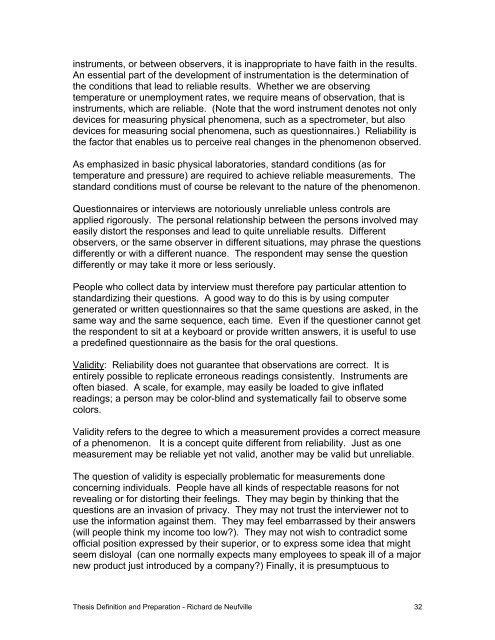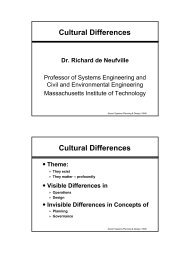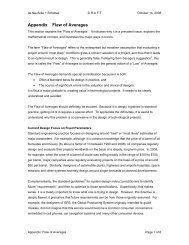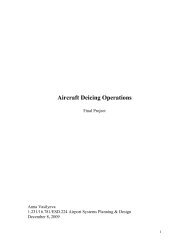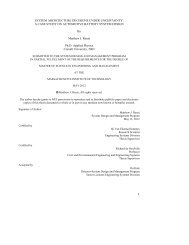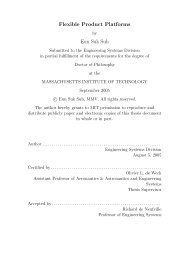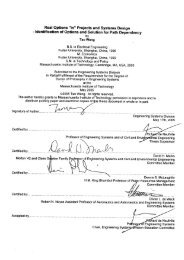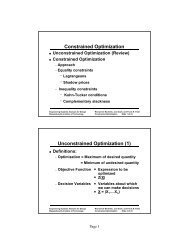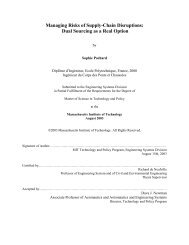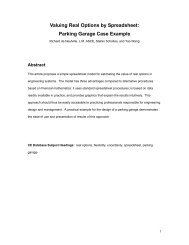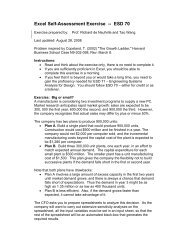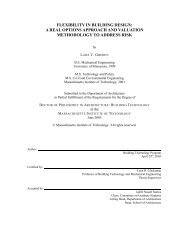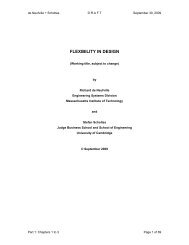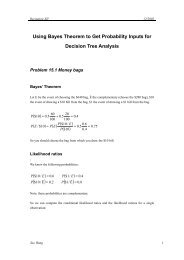Richard de Neufville's TPP SM Thesis Manual - Title Page - MIT
Richard de Neufville's TPP SM Thesis Manual - Title Page - MIT
Richard de Neufville's TPP SM Thesis Manual - Title Page - MIT
- No tags were found...
Create successful ePaper yourself
Turn your PDF publications into a flip-book with our unique Google optimized e-Paper software.
instruments, or between observers, it is inappropriate to have faith in the results.An essential part of the <strong>de</strong>velopment of instrumentation is the <strong>de</strong>termination ofthe conditions that lead to reliable results. Whether we are observingtemperature or unemployment rates, we require means of observation, that isinstruments, which are reliable. (Note that the word instrument <strong>de</strong>notes not only<strong>de</strong>vices for measuring physical phenomena, such as a spectrometer, but also<strong>de</strong>vices for measuring social phenomena, such as questionnaires.) Reliability isthe factor that enables us to perceive real changes in the phenomenon observed.As emphasized in basic physical laboratories, standard conditions (as fortemperature and pressure) are required to achieve reliable measurements. Thestandard conditions must of course be relevant to the nature of the phenomenon.Questionnaires or interviews are notoriously unreliable unless controls areapplied rigorously. The personal relationship between the persons involved mayeasily distort the responses and lead to quite unreliable results. Differentobservers, or the same observer in different situations, may phrase the questionsdifferently or with a different nuance. The respon<strong>de</strong>nt may sense the questiondifferently or may take it more or less seriously.People who collect data by interview must therefore pay particular attention tostandardizing their questions. A good way to do this is by using computergenerated or written questionnaires so that the same questions are asked, in thesame way and the same sequence, each time. Even if the questioner cannot getthe respon<strong>de</strong>nt to sit at a keyboard or provi<strong>de</strong> written answers, it is useful to usea pre<strong>de</strong>fined questionnaire as the basis for the oral questions.Validity: Reliability does not guarantee that observations are correct. It isentirely possible to replicate erroneous readings consistently. Instruments areoften biased. A scale, for example, may easily be loa<strong>de</strong>d to give inflatedreadings; a person may be color-blind and systematically fail to observe somecolors.Validity refers to the <strong>de</strong>gree to which a measurement provi<strong>de</strong>s a correct measureof a phenomenon. It is a concept quite different from reliability. Just as onemeasurement may be reliable yet not valid, another may be valid but unreliable.The question of validity is especially problematic for measurements doneconcerning individuals. People have all kinds of respectable reasons for notrevealing or for distorting their feelings. They may begin by thinking that thequestions are an invasion of privacy. They may not trust the interviewer not touse the information against them. They may feel embarrassed by their answers(will people think my income too low?). They may not wish to contradict someofficial position expressed by their superior, or to express some i<strong>de</strong>a that mightseem disloyal (can one normally expects many employees to speak ill of a majornew product just introduced by a company?) Finally, it is presumptuous to<strong>Thesis</strong> Definition and Preparation - <strong>Richard</strong> <strong>de</strong> Neufville 32


